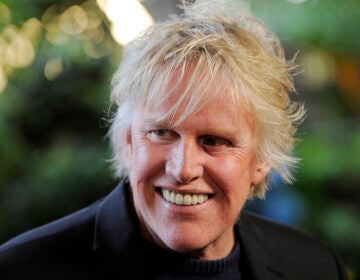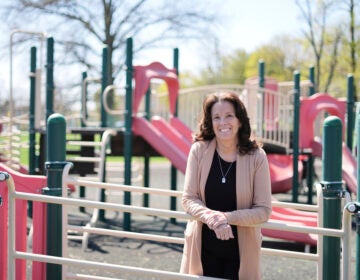Grudging acceptance of Gov. Christie’s policies sets tone as school chiefs gather

This year's gathering of New Jersey superintendents was held at Jackson Liberty High School in Jackson. (Photo via Wikicommons)
When it came time yesterday for the question-and-answer session at state Education Commissioner Chris Cerf’s now-annual convocation with school superintendents, there was an awkward moment: nobody stepped to the microphone.
“Oh, I know you have questions,” Cerf said wryly, aware of the challenges facing school leaders and their districts in a momentous year of change.
And while a few school superintendents did ultimately wander forward, the hesitation spoke to a different tenor – some would call it calm, others resignation — that is coming over this group in the fourth year of Gov. Chris Christie’s tenure and the third year for his education commissioner.
Compared with previous convocations at which tensions were high and questions were plentiful, the more than 300 school leaders gathered yesterday at Jackson Liberty High School appeared to be getting used to the new world order under Cerf and his boss.
Gary McCartney, the South Brunswick superintendent and president of the state’s superintendents group, which hosted the event, said he saw the three years of convocations with Cerf as a period of evolution.
“I think people are beginning to assimilate,” he said. “In the first year, it was kicking and screaming, hoping (the initiatives) would go away. The second was wringing your hands and whining, thinking they would go away. Now you say, I don’t have any more tantrums, I think we’re going to do this.”
That’s not to say it has been an easy transitions – there are plenty of challenges ahead.
Conversations with a handful of superintendents afterward indicated there is still a bit of a siege mentality in the schools, with some still smarting under budget cuts three years ago and all now facing more state mandates and requirements.
It was a point ultimately raised in the question-and-answer session at the end of the three-hour event, when Woodbury City Superintendent Joseph Jones stepped to the microphone.
“One of the things I’m looking for is the Department of Education to celebrate what’s right, where schools have been successful in closing achievement gaps,” he said. “We need to hear the success stories.
“The more that we try to make our schools into businesses, the problem I start to feel is I can’t share with my colleagues the success stories,” he said. “Instead, I’m being ranked, I’m being compared…my community is looking at where I stand.”
Cerf took the question from the stage, trying to rebut the notion that schools are being treated like businesses, but saying that there is a very clear mission at hand.
“The first thing we need to recognize is whom do we represent,” Cerf said. “I don’t represent employees, I don’t represent communities. I represent the children of the state, and I have defined as my mission to make sure the children are getting the best education they can.”
A big task facing schools this year is the roll-out of the new teacher and principal evaluation system that will hold staff to specific measures — in both their daily work in classrooms and in the academic performance of their students.
Those taking part in the convocation yesterday spent considerable time discussing the new system, known as AchieveNJ, with four superintendents who were going through different parts of the process speaking about their experiences so far.
The superintendents said there are many shortages, from the capacity of administrative staff to conduct the evaluations to the continued tensions and uncertainties among teachers about what the new measures will bring.
Still, the superintendents tried to assure the crowd that there is a growing acceptance to the process, and that high anxiety is giving way to simple nervousness.
“Effective teaching of the last 20 years will still show up,” said Monica Browne, superintendent of Upper Saddle River schools. “You aren’t suddenly going to go from effective to ineffective because of a different instrument being used.”
Another superintendent from a district that was part of the pilot tryout of the new evaluation process said it has already improved how teachers and administrators communicate and work together.
Still, Superintendent Michael Gorman of Pemberton said three of his 10 principals retired at least in part because of the new system, which will judge principals just as rigorously as teachers, if not more.
“The fact of the matter is there is a transition, and the new ones we brought on now know that their success will rest with the success of their teachers,” he said.
Another major task ahead is for schools to adapt and adjust to the new national Common Core State Standards, as well as new online testing aligned to those standards, starting in 2015.
One superintendent mentioned the experience in New York City – where achievement levels dropped by half with the switch to new testing tied to the Common Core standards.
She asked Cerf if he thought that would happen in New Jersey.
Cerf said New Jersey has been better at transitioning to the new standards. And he held out the possibility that setting different cutoff scores on the new tests might soften the blow.
But he also did not rule out that achievement levels might drop, but adding that such a decline “isn’t necessarily a bad thing.”
“We will see a change,” he said. “I don’t think it will be as traumatic as New York City, but it will be a significant impact.”
One familiar topic did not come up during the event — the Christie administration’s caps on superintendent salaries.
The caps are now three years old, and more school leaders are being affected as their previous contracts end, either taking mandated pay cuts or leaving their jobs. This school year, the state’s districts have 80 new superintendents.
Asked why the subject wasn’t addressed, the superintendents association’s executive director, Richard Bozza, said it might be a sign of resigned acceptance that policies and rules enacted under this administration weren’t likely to change anytime soon.
“I was not surprised,” Bozza said. “I think people understand the cap is the cap and won’t be changed with this commissioner. This isn’t the forum.
“But I still hear plenty about it, by the way,” he added.
_______________________________________________________
NJ Spotlight, an independent online news service on issues critical to New Jersey, makes its in-depth reporting available to NewsWorks.
WHYY is your source for fact-based, in-depth journalism and information. As a nonprofit organization, we rely on financial support from readers like you. Please give today.




